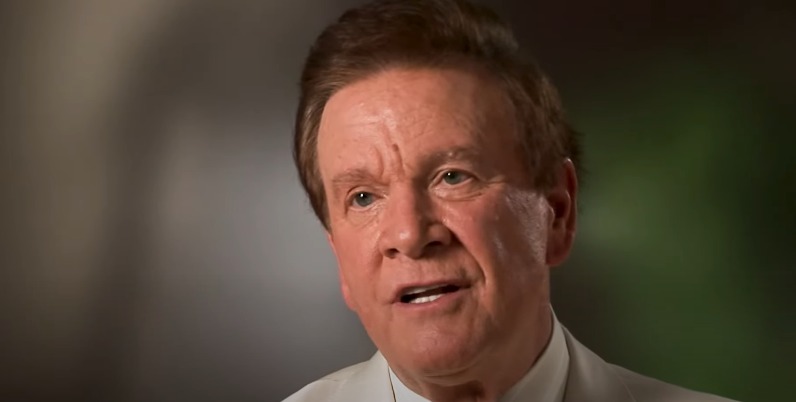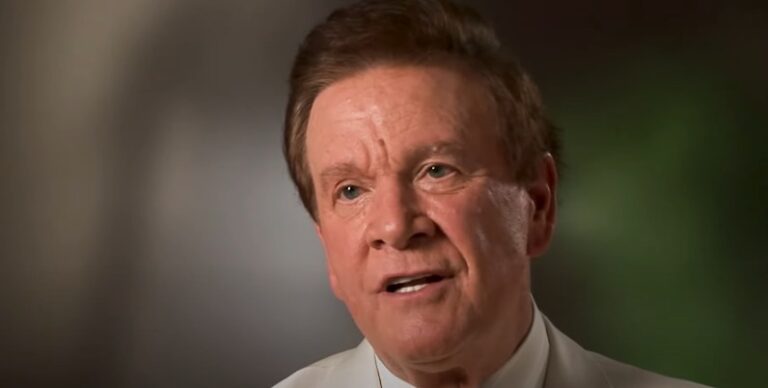Wink Martindale became a true icon in the world of entertainment thanks to his incredible seven-decade career. His estimated net worth of $20 million at the time of his death is evidence of his adaptability and success in a media environment that is changing quickly. Martindale’s success wasn’t entirely fueled by his time in front of the camera, even though he became associated with popular game shows like Gambit and Tic-Tac-Dough. His legacy as a producer, TV host, and radio DJ says a lot about his adaptability and unwavering motivation.
Martindale’s career started in the exciting world of radio, starting with the very beginning at WPLI in Jackson, Tennessee, where he took his first microphone at the age of 17. He went on to play a ground-breaking role at WHBQ in Memphis. When he assisted in the 1954 release of Elvis Presley’s debut single, That’s All Right, he had a front-row seat to history. This significant event solidified Martindale’s position in pop culture history in addition to signaling the emergence of rock ‘n’ roll. Nevertheless, his move to television in the 1970s was what really cemented his legacy and made him a household name, even with these early triumphs.
| Personal Information | Details |
|---|---|
| Full Name | Winston Conrad “Wink” Martindale |
| Date of Birth | December 4, 1933 |
| Place of Birth | Jackson, Tennessee, USA |
| Date of Death | April 15, 2025 |
| Occupation | Radio DJ, Television Host, Producer |
| Known For | Hosting “Tic-Tac-Dough,” “Gambit,” “High Rollers” |
| Net Worth (at the time of death) | $20 million |
| Spouse | Ellie Martindale |
| Children | 1 son |
| Website | Wikipedia: Wink Martindale |
The way Martindale transitioned to the television industry was remarkably seamless. In the 1970s, game shows were gaining popularity, and he became a popular host due to his cool-headedness and innate ability to relate to contestants. Viewers will always remember shows like High Rollers and Tic-Tac-Dough, especially because of how Martindale’s charisma and wit enthralled viewers and fostered a lively yet approachable environment.

Notably, hosting wasn’t the only thing he did. Martindale’s production endeavors and varied entertainment-related investments were major contributors to his wealth accumulation. Beyond his salary, he made sure his financial success extended by producing many of the shows he hosted. Because of his entrepreneurial spirit and his legacy in broadcasting, he was able to accumulate a net worth of $20 million by the time of his death.
His capacity to remain relevant over several decades of media evolution forms the basis of Martindale’s career in its larger context. Martindale evolved and expanded along with game shows. He was not just riding a wave of success; he played a key role in its direction. Game show hosts like Martindale left a legacy that helped define the genre and gave it a lasting cultural significance. Particularly in the way contemporary hosts approach their roles, his influence can still be seen today. There are clear echoes of Martindale’s style in everyone from Steve Harvey to Drew Carey.
Martindale has had a significant influence on the entertainment industry that goes well beyond his remarkable financial success. In addition to being a host, he was a mainstay in American homes, encouraging excitement and a sense of community. Because they provided a unique fusion of tension and joy, his shows became a staple of family entertainment.
Hosting game shows was never the only factor in Martindale’s financial success. In actuality, decades of meticulous brand development and unseen entrepreneurship provided the foundation for his long-lasting wealth. Wink was adept at turning his notoriety into material possessions, from investing in syndicated shows to licensing his image. In the 1980s and 1990s, his production company, Wink Martindale Enterprises, created a number of pilots, many of which saw some success in local markets or late-night reruns. Each one was a tiny but consistent drip into his expanding financial reservoir.
Martindale’s voice continued to be a valuable asset outside of television. Long after recording sessions were over, he continued to earn royalties by lending it to audiobooks, radio countdowns, and commercials. His late-career switch to YouTube, where he curated and narrated old TV clips from the heyday, was perhaps the most endearing to his fans. Even though that channel was small by influencer standards, it brought in thousands of dollars in ad revenue and restored Wink’s appeal to younger audiences, demonstrating his understanding of media and its evolution.



